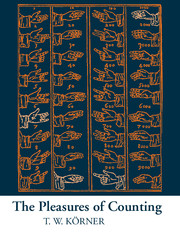Book contents
- Frontmatter
- Contents
- Preface
- I The uses of abstraction
- II Meditations on measurement
- III The pleasures of computation
- IV Enigma variations
- V The pleasures of thought
- 17 Time and chance
- 18 Two mathematics lessons
- 19 Last thoughts
- Appendix 1 Further reading
- Appendix 2 Some notations
- Appendix 3 Sources
- Bibliography
- Index
- Acknowledgements
17 - Time and chance
Published online by Cambridge University Press: 05 May 2014
- Frontmatter
- Contents
- Preface
- I The uses of abstraction
- II Meditations on measurement
- III The pleasures of computation
- IV Enigma variations
- V The pleasures of thought
- 17 Time and chance
- 18 Two mathematics lessons
- 19 Last thoughts
- Appendix 1 Further reading
- Appendix 2 Some notations
- Appendix 3 Sources
- Bibliography
- Index
- Acknowledgements
Summary
Why are we not all called Smith?
In Section 15.1 we saw that the question of whether the Turing bombes would work depended on whether an effectively random process in which ‘mother statements’ give rise to a certain random number of ‘daughter statements’ which in turn give rise to ‘granddaughter statements’ and so on would die away quickly or give rise to a family containing all (or almost all) possible statements. The bombe problem is complicated by several special features and, though I hope that the discussion of the next two sections will shed some light on it, I shall concentrate on simpler but related problems.
Sir Thomas Browne wrote ‘Generations pass while some trees stand and old families last not three oaks’. (The quotation is taken from Kendall's fascinating papers [114] and [115].) Less concisely, Galton wrote:
The decay of the families of men who occupied conspicuous positions in past times has been a subject of frequent remark, and has given rise to various conjectures. It is not only the families of men of genius or those of the aristocracy who tend to perish, but it is those of all whom history deals, in any way, even such men as the burgesses of towns, …. The instances are very numerous in which surnames that were once common have since become scarce or have wholly disappeared.
- Type
- Chapter
- Information
- The Pleasures of Counting , pp. 413 - 451Publisher: Cambridge University PressPrint publication year: 1996



